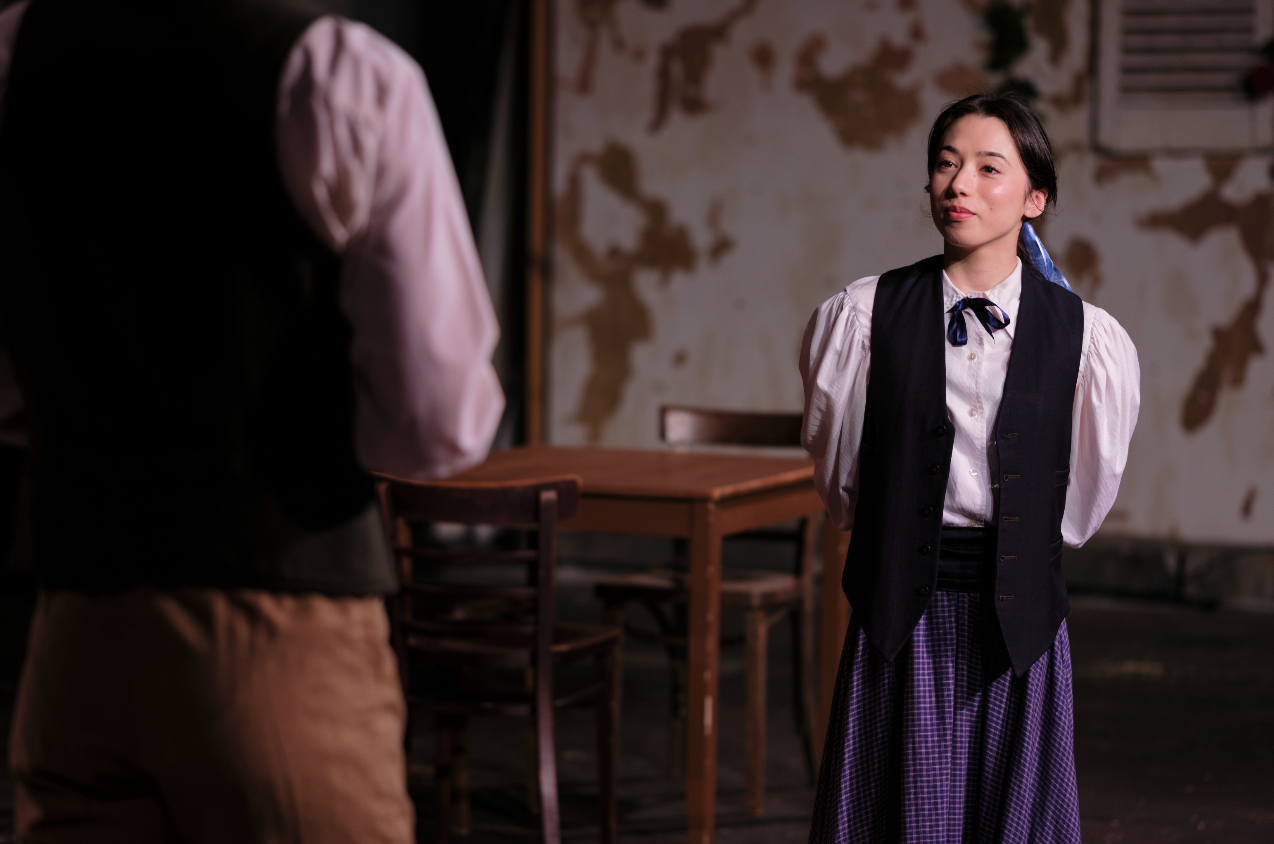In this special interview, we sit down with Sage Chihiro Kikui, a Third Year student at Actors Centre Australia, who recently took on the role of Emily Webb in our production of Our Town. Known for its quiet power and profound themes, Thornton Wilder’s play explores the fleeting nature of life and the beauty hidden in everyday moments. For Sage, this role became more than just a performance—it became a deeply personal journey.
As part of her creative process, she wrote a poem as a farewell to Emily, using poetry not just as expression, but as a way to connect, process, and ultimately let go.
Here, Sage shares how Our Town moved her as an actor, how poetry deepened her performance, and how Emily changed her—on and off the stage.
[All ‘Our Town’ production photos by Robert Catto.]
ACA: Tell us about Our Town.
Sage: Our Town explores the routine life of Emily Webb as she comes face to face with the universal stages of life—love, marriage, death, and the unknown realm of eternity after death. It makes the audience confront our own mortality, the brevity of life, and the fragility of human relationships.
The play pauses time for the audience, reminding them of the weight and importance of those short and small moments in our daily lives.
Like any outlet of creativity—whether it be a painting, music, or any form of expression birthed from a human mind—we often don’t appreciate it until it can no longer be created again. John Keats, who I’ve learned about in our voice training at ACA, was a classical legend in poetry. Yet he wasn’t recognised for his talent or his inspiration to future writers until long after he had passed.
If you’re lucky enough to watch a production of Our Town, be ready for a very reflective drive home—and bring some tissues.
ACA: What does the play mean to me? What was it like to play Emily Webb?
Sage: As a performer, I find such purpose in being able to feel as deeply as we humans are capable of feeling. We, as actors, are given permission to step into another’s shoes—to live and experience everything that might be familiar to us, or completely new. That is one thing technology could never truly understand, and more importantly, could never sympathise with.
At the time I was cast and began rehearsing, a lot of my personal life was coincidentally aligning with Emily’s. It felt like such a blessing—like we were going through it together. Her bold choices and her confidence, I believe, seeped into a bolder, more confident version of myself. That strength helped me with my own choices during that time.
She truly made me appreciate my life, and I am so grateful for that. I know I will continue making bold and strong choices as I pursue this acting career—until the very end.
ACA: What inspired me to write your poem?
Sage: We rehearse all the technical things—movement, placement, the skeleton of the play. Then, once you’re up on stage, you hit those marks… but the rest is about resetting and reliving that character’s experience.
It wasn’t until the tech run—where the director works with the performance space, lights, and sound—that something truly shifted. My director, Adam Cook, played me an instrumental piece he was going to use in Act 3, during that massive tonal shift where the audience is placed in a limbo with Emily after her death. She’s battling with the reality that she can never go back—she’s stuck in the cemetery, watching life go on without her.
I remember saying, “I don’t have to act in this last act.” It was so heartbreaking… I just needed to live in it. The music became another creative outlet guiding my performance. That’s what you see in my Instagram post.
And as I sat with the music, I thought, I can’t just post this and leave it here. I had to write a farewell to Emily.
ACA: How does poetry help inform your acting?
Sage: Poetry creates a personal relationship between me and my character. The poem I wrote came at the very end of a long process of exploring Emily—though, in truth, I’m still exploring her every time I perform.
It also became a method of derolling, which is so important for actors—to know how to let go of a character, especially when they live so close to your heart.
With the poetry we study in school, we get glimpses into the writer’s experiences and their perspective on the world. But for me, I need to express it in my words to create an emotional connection to the character’s text. At the end of the day, when we’re reading someone else’s poetry, it’s still someone else’s writing—and that can make it harder to connect.
Writing the poem was like writing a letter to Emily, saying: “This is how I see you, and how I see you in your world… is this right?” And Emily responds, “Well, you’re playing me—so let’s see if it feels right.”
And we just… fit, like puzzle pieces.
If it feels right, do it. And I felt like I needed to write that poem—for her, from me.
ACA: Thank you, Sage! Click here to view her original Instagram post with the poem, or read it here in it’s entirety …
What We Never See for Emily Webb
In the morning, I tie my ribbon around my hair
I memorize Latin, fold laundry,
laugh when George stumbles over his words.
Mama says sit straight,
Papa reads the Sentinel.
I try to be good.
The days pass like white clouds—
quiet, ordinary,
full of things I think I’ll remember.
I marry the boy next door.
The world seems
stitched together with Sunday hymns
and the smell of coffee rising
through our kitchen floorboards.
But time—it keeps walking,
doesn’t it?
Even when we forget to wave.
Then, silence.
A grave on the hill.
They say I died in childbirth.
(Funny, I feel wide awake.)
I sit among the dead and ask:
Can I go back?
Just for a day.
Just to look.
I return.
I see my mother’s hands
folding a birthday cake with care.
My father adjusting his glasses.
Me—twelve again,
not knowing I’m already
leaving.
How blind we are
all of us
to breakfast,
to blue sky through a kitchen window,
to the sound of someone saying our name
as though it matters.
I cry,
but they don’t hear.
I whisper:
Let’s look at one another.
(Really look.)
And then I go,
into the quiet
where nothing is lost,
only
seen too late.



